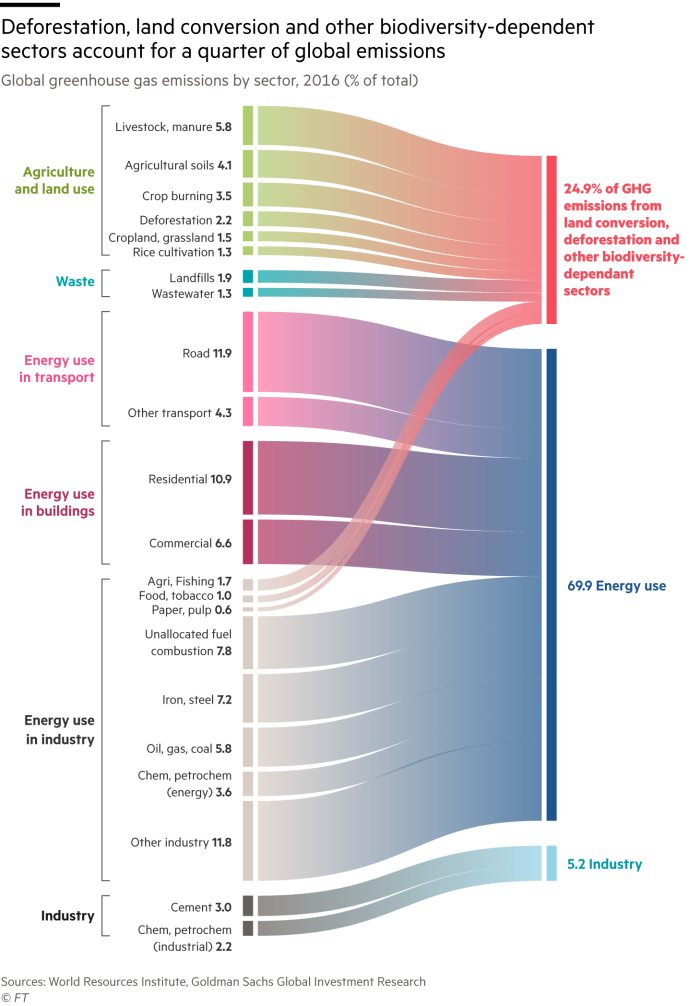The UN development chief has warned against “illogical” and “perverse” subsidies to industries estimated at $1.8tn that harm the planet, as the body pushes for a global deal to reverse the widespread destruction of nature.
Damage to the natural world has begun to alarm investors and economic policymakers who recognise the role of forests in removing carbon from the atmosphere.
It is at the heart of turbulent discussions at the UN COP15 nature summit in Montreal schedule to conclude this week. The UN scientific body on nature, known as the Intergovernmental Platform on Biodiversity and Ecosystem Services, found in its landmark 2019 assessment that 1mn animal and plant species were in danger of extinction.
The World Economic Forum also estimated in a 2020 report that more than half of global GDP, or about $44tn, was “moderately or highly dependent on nature”.
Speaking to the Financial Time from Montreal, Achim Steiner, the administrator of the United Nations Development Programme, said government subsidies were contributing to biodiversity loss by encouraging unsustainable farming and fishing practices.
“Paying people to do things that ultimately destroy biodiversity in the argument of short-term economic benefit is self-defeating,” said Steiner.
Nearly $2tn annually, equivalent to around 2 per cent of global gross domestic product, is invested in subsidies connected to biodiversity loss, according to analysis from Business for Nature and Earth Track.
Fossil fuel, agriculture and water industries received more than 80 per cent of all environmentally harmful subsidies per year, the analysis shows.
Using data from the IEA and OECD, the group found that roughly $640bn of support was given to the fossil fuel industry each year, while around $520bn per year subsidised the agriculture industry.
In its report, Business for Nature said the agriculture funding included “unsustainable” agricultural practices that caused soil erosion, water pollution, commodity-driven deforestation, greenhouse gas emissions and conversion of natural habitats.
Around $350bn annually is allocated to “unsustainable” use of freshwater that contributes to water pollution and harms ecosystems, while around $90bn is devoted to construction subsidies globally, $85bn to transport and $50bn in fishing.
“The oceans are essentially becoming devoid of fish stocks,” said Steiner. “We keep having to pay our fisherfolk to go farther and farther to find some fish, we subsidise their diesel costs so they can travel farther because fish stocks closer to where we live have collapsed . . . this is illogical.”

As part of the 2010 UN biodiversity summit, 190 countries agreed to the phasing-out or reform of subsidies harmful to nature by 2020. However, governments failed to meet this target.
Additionally, very little is spent on protecting nature. According to a report from the Paulson Institute, less than $150bn per year is spent on biodiversity conservation.
Earlier this year, the World Bank declared the global decline in nature “a critical development issue”, disproportionately affecting developing economies. Its statement said that “misaligned policy and subsidies incentives place a negative price tag on nature’s services”.
The World Bank said the volume of subsidies that are “harmful to development” was “at least five or six times more than the amount of funding devoted to protecting biodiversity”.
Protecting nature has been touted as a way to combat climate change. Deforestation and human land use account for around a quarter of greenhouse gas emissions, according to the World Resources Institute.
In a recent report, Goldman Sachs said growing the net carbon removal potential of forests was “an important input” to help the world limit global warming to the 1.5C goal set down in the Paris Agreement. Temperatures have already risen at least 1.1C
“Companies will need to deploy capital towards conservation and restoration as net zero deadlines inch closer,” said Goldman analysts in a recent report.
Climate Capital

Where climate change meets business, markets and politics. Explore the FT’s coverage here.
Are you curious about the FT’s environmental sustainability commitments? Find out more about our science-based targets here






